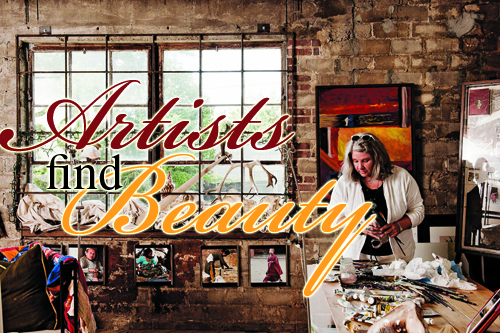Artists finds beauty in the business of their trade
Ask artists about the business of art: observe rolling eyes and sighs of pure exasperation. A necessary evil often is the response, followed by frustration at the lack of universal standards to value artwork. Then add the need to master targeting, marketing and selling artwork in cyclical, unpredictable economic times and general confusion is the only certainty.
Steve Williams, Dolf James and Joanelle Mulrain, successful local artists, used business experience to bolster their marketing savvy. Williams, artist/gallerist and president of his family’s 50-year-old business, Harbinger Sign, started as a graphic artist. Later, at various times, he painted large abstracts, worked for Harbinger, opened local galleries and sold out an exhibit in New York City’s SOHO area.
“From business to art and back, I learned you build your market yourself – everything: create art, market/PR, sell, accounting, ship. Agents, galleries do these things for artists but usually at 50% cost,” he
said. “The bottom line is most artists don’t do enough: stick to one theme, paint for a year, understand why/what you are creating. Create from the heart, from passion… learn where your work will be most successful…not just one gallery or market.”
Dolf James, lifelong artist and corporate executive, calls the business of art, “a 3D chess game with no rules, laws or government oversight”. That lets anyone create art in different ways at various levels: from creating at home/selling locally, to big-time shows at galleries.
“How do we value art? Should it be based on where we train, how much sold…the cost of materials? I learned by being in the business, just doing it…but first of all the art has to be good. Artists must be prolific, build a body of work and public awareness, then galleries will take them seriously. You can’t be a one-hit wonder,” James said. “The great thing is you don’t need to sell art to make a living as an artist…explore grants, fellowships, sponsorships, corporate deals, museum and installation jobs.”
Joanelle Mulrain spent 30 years on the “corporate train” as she calls her careers: Jacksonville Orthopedic Institute Marketing Director, corporate vice president at Baptist Health, ran Senator Bill Nelson’s Washington office and published author.
“I had waited so long, started painting in 2005 and it just took off,” she said. “My corporate background set me up to be able to take advantage of opportunities. Artists must operate as a business, be licensed to sell, work fulltime, pay quarterly taxes, understand rights, keep every receipt, share your do’s and don’ts, learn from others, be open to ideas and collaborate!”
The Cultural Council of Greater Jacksonville recently brought Creative Capital, a national nonprofit providing financial and advisory support for artists, to host free seminars for the third time. Participants applied to attend, according to Amy Crane, deputy director of the council.
“We wanted a variety of artists to benefit as much as possible from valuable direction on business aspects they could apply to their own marketing and funding,” Crane said. “Our individual artists create an economic impact for a more vibrant Jacksonville and these types of educational opportunities support their success.”








